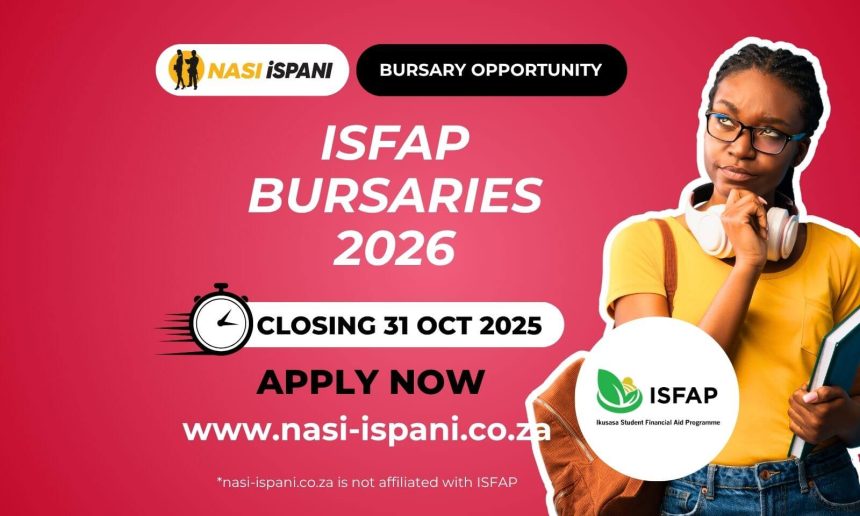South African students from the “missing middle” have an opportunity to access higher education funding through the ISFAP Bursaries for the 2026 academic year. The Ikusasa Student Financial Aid Programme (ISFAP) has opened applications for first-year undergraduate students who plan to study in fields of high demand at partner universities across the country. Applications close on 31 October 2025, and interested candidates are urged to prepare early.
What Are ISFAP Bursaries?
ISFAP was created to provide financial support for students whose household income is too high to qualify for NSFAS but too low to afford university fees without assistance. Known as the “missing middle,” this group has a combined household income of between R350 000 and R600 000 per year. ISFAP bursaries are fully comprehensive, covering tuition, accommodation or travel, meals, study materials, and a monthly stipend. Students also receive structured support including academic mentoring, life skills training, and social and medical support.
Partner Universities
The 2026 ISFAP bursary programme applies to a wide range of public universities and universities of technology in South Africa, including:
- University of Pretoria (UP)
- University of Venda (UNIVEN)
- University of Cape Town (UCT)
- University of the Witwatersrand (Wits)
- Tshwane University of Technology (TUT)
- Walter Sisulu University (WSU)
- University of the Free State (UFS)
- Cape Peninsula University of Technology (CPUT)
- North-West University (NWU)
- University of the Western Cape (UWC)
- University of Limpopo (UL)
- Vaal University of Technology (VUT)
- Sefako Makgatho Health Sciences University (SMU)
- Rhodes University (RU)
- University of Fort Hare (UFH)
- Durban University of Technology (DUT)
- University of Zululand (UNIZULU)
- Mangosuthu University of Technology (MUT)
- University of Mpumalanga (UMP)
- Sol Plaatje University (SPU)
- University of South Africa (UNISA)
- University of KwaZulu-Natal (UKZN)
- Stellenbosch University (SU)
- Nelson Mandela University (NMU)
- University of Johannesburg (UJ)
- Central University of Technology (CUT)
Fields of Study Covered
ISFAP funds students in occupations of high demand, ensuring graduates enter fields critical to South Africa’s economic development. These include:
- Engineering: Chemical, Civil, Electrical, Mechanical, Industrial, Mining, Metallurgical, Computer, Mechatronics, Biomedical, and Marine.
- Health Sciences: Medicine, Dentistry, Nursing, Radiography, Physiotherapy, Occupational Therapy, Audiology, Speech-Language Pathology, Pharmacy, Biokinetics, and Complementary Medicine.
- Information Technology: Computer Science, Information Systems, Data Science, Informatics, and AI-related studies.
- Commerce and Management: Accounting, Actuarial Science, Finance, Marketing, HR, Economics, Business Management, Supply Chain, and Logistics.
- Built Environment: Architecture, Construction Management, Quantity Surveying, Real Estate, and Town & Regional Planning.
- Agriculture and Natural Sciences: Agricultural Economics, Plant and Animal Sciences, Food Technology, Environmental Studies, Forestry, Geology, and Biotechnology.
- Social Sciences and Arts: Law, Education, Social Work, Psychology, Political Studies, Media, Fine Arts, Music, Theatre, and Languages.
Eligibility Criteria
Applicants must meet the following requirements:
- Be a South African citizen.
- Be in Matric (2025) or already hold a Matric certificate.
- Have been accepted to study at a listed partner institution in 2026.
- Be enrolling in first-year undergraduate studies.
- Have a household income not exceeding R600 000 per year.
- Show proof of financial need and academic potential.
Some universities also require applicants to write the National Benchmark Test (NBT) as part of the selection process.
Required Documents
Applicants must upload certified copies of:
- South African ID document.
- Matric results or latest school results if still in Grade 12.
- Proof of acceptance at a partner university.
- ISFAP Funding Application Consent Form (completed by household contributors).
- Proof of household income (recent payslips, affidavit, or grant/pension proof).
- ID documents of parents or guardians.
All documents must be certified within the last three months.
Read more: Bursary Application Checklist: Documents You Must Have
How to Apply
Applications must be submitted online via the ISFAP Bursary Application 2026 portal. First, register an account, then log in to complete the application. The system will guide you through the process of uploading documents and filling in details about your household income and academic achievements.
The ISFAP Bursaries do not replace NSFAS. Instead, they target students in the missing middle with strong academic potential. Funding comes from government bodies, non-profits, private donors, and industry partners, ensuring sustainability for years to come.
If you dream of studying in 2026 but fear the costs, this bursary could be your opportunity. Apply before 31 October 2025 and take your first step toward building a career in a field of national importance.
